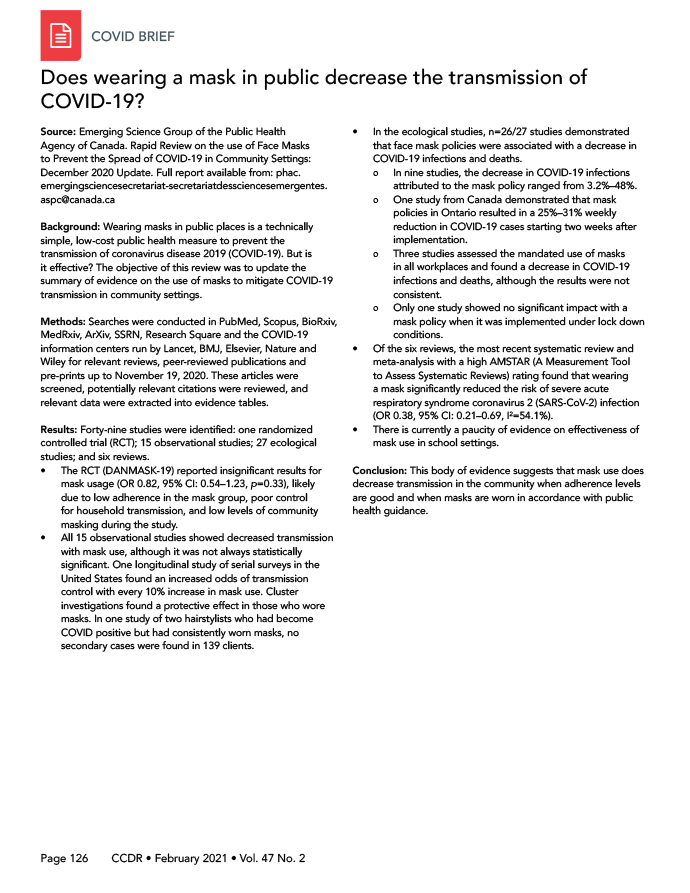Mask wearing does it decrease transmission of COVID-19?

 Download this article as a PDF
Download this article as a PDFPublished by: The Public Health Agency of Canada
Issue: Volume 47-2: HIV Testing in Canada in the Past Decade 2009–2019
Date published: February 2021
ISSN: 1481-8531
Submit a manuscript
About CCDR
Browse
Volume 47-2, February 2021: HIV Testing in Canada in the Past Decade 2009–2019
COVID brief
Does wearing a mask in public decrease the transmission of COVID-19?
Source: Emerging Science Group of the Public Health Agency of Canada. Rapid Review on the use of Face Masks to Prevent the Spread of COVID-19 in Community Settings: December 2020 Update. Full report available from: phac.emergingsciencesecretariat-secretariatdessciencesemergentes.aspc@canada.ca
Background: Wearing masks in public places is a technically simple, low-cost public health measure to prevent the transmission of coronavirus disease 2019 (COVID-19). But is it effective? The objective of this review was to update the summary of evidence on the use of masks to mitigate COVID-19 transmission in community settings.
Methods: Searches were conducted in PubMed, Scopus, BioRxiv, MedRxiv, ArXiv, SSRN, Research Square and the COVID-19 information centers run by Lancet, BMJ, Elsevier, Nature and Wiley for relevant reviews, peer-reviewed publications and pre-prints up to November 19, 2020. These articles were screened, potentially relevant citations were reviewed, and relevant data were extracted into evidence tables.
Results: Forty-nine studies were identified: one randomized controlled trial (RCT); 15 observational studies; 27 ecological studies; and six reviews.
- The RCT (DANMASK-19) reported insignificant results for mask usage (OR 0.82, 95% CI: 0.54–1.23, p=0.33), likely due to low adherence in the mask group, poor control for household transmission, and low levels of community masking during the study.
- All 15 observational studies showed decreased transmission with mask use, although it was not always statistically significant. One longitudinal study of serial surveys in the United States found an increased odds of transmission control with every 10% increase in mask use. Cluster investigations found a protective effect in those who wore masks. In one study of two hairstylists who had become COVID positive but had consistently worn masks, no secondary cases were found in 139 clients.
- In the ecological studies, n=26/27 studies demonstrated that face mask policies were associated with a decrease in COVID-19 infections and deaths.
- In nine studies, the decrease in COVID-19 infections attributed to the mask policy ranged from 3.2%–48%.
- One study from Canada demonstrated that mask policies in Ontario resulted in a 25%–31% weekly reduction in COVID-19 cases starting two weeks after implementation.
- Three studies assessed the mandated use of masks in all workplaces and found a decrease in COVID-19 infections and deaths, although the results were not consistent.
- Only one study showed no significant impact with a mask policy when it was implemented under lock down conditions.
- Of the six reviews, the most recent systematic review and meta-analysis with a high AMSTAR (A Measurement Tool to Assess Systematic Reviews) rating found that wearing a mask significantly reduced the risk of severe acute respiratory syndrome coronavirus 2 (SARS-CoV-2) infection (OR 0.38, 95% CI: 0.21–0.69, I2=54.1%).
- There is currently a paucity of evidence on effectiveness of mask use in school settings.
Conclusion: This body of evidence suggests that mask use does decrease transmission in the community when adherence levels are good and when masks are worn in accordance with public health guidance.
